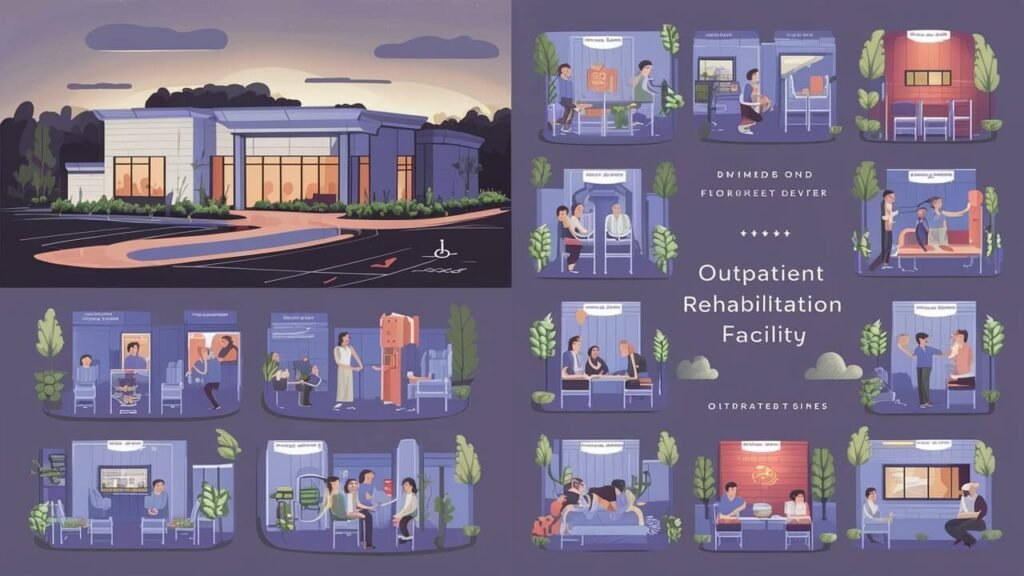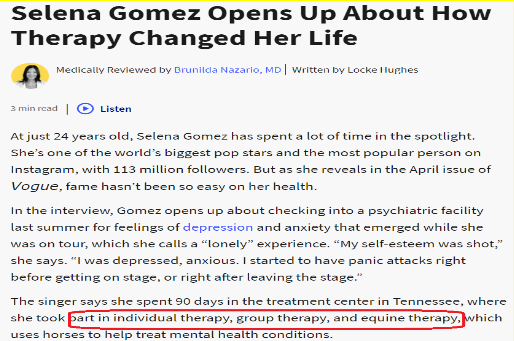With first-hand experience, I would say Outpatient rehab is a program that lets you get care and support from professionals while living at home and doing your regular things. Inpatient rehab requires you to stay in a center for some time.
Even the most recent research shows that over 7.5 million outpatient rehabs were made in the US. I worked and still work with patients who are getting treatment from our rehab and balancing professional life and family, too.

To know how it works, and what happens here, explore the blog and get answers.
What Happens in Outpatient Rehab? Know the Procedures
As an expert, I assure outpatient alcohol rehab programs are a mix of different services and activities designed around your needs, surroundings, and tastes.
Some common parts of outpatient rehabilitation you may face are:
Individual Therapy
That is a one-on-one session. A qualified therapist helps you deal with trauma, mental health problems, or stress that may be at the root of your addiction. Individual treatment also helps you learn how to deal with problems, determine what sets you off, and avoid relapse.
Even Selena Gomez went abroad to get individual therapy and other therapies for mental illness in 2014 and shared her experience later. But she received an inpatient treatment or outpatient treatment, it’s confidential till now. Many online news portals, and sites cover the news.
Source: E! News

Source: WebMD

Group Therapy
Group therapy is a meeting with other patients in recovery. That is led by a specialist. Group treatment can help you get support, feedback, and motivation.
There you may get groups like psychoeducational, skill development, cognitive behavioral, interpersonal process, and many more. Here, you get to know about other’s experiences, which enables you to regain confidence.
I noticed changes in my patients after attending group therapy. I found it working as motivation among the patients.
Medication Management
This service helps you get better by prescribing outpatient alcohol rehab. It keeps an eye on the medicines you take. Medication can ease withdrawal symptoms, reduce urges, treat mental health problems, and prevent overdose.
I talked with one of my patients, Jolley, who mentioned that this part was the most effective one during her rehabilitation. As it managed to prevent relapse. Medication management requires regular visits to a specialist to monitor your health.
Life-Skills Training
With first-hand experience, I assure you that this teaches you valuable skills to help you in your everyday life. Training in life skills can cover things like planning, time management, trouble handling, gaining communication skills, getting ready for a job, hygiene, nutrition, and more.
Training in life skills can help you feel better about yourself, gain confidence, and become more independent.
I’ve seen Renaissance Recovery, California Detox and Treatment, Oro House Recovery, Covenant Hills Women’s Treatment Center, and many more that are well-known for life-skill training in outpatient treatments.
12-Step Programs
From my perspective, 12-step programs are peer support groups that follow the rules of Alcoholics Anonymous (AA) or Narcotics Anonymous (NA).
12-step programs can help you connect with a higher power, work through recovery steps, find a mentor, and attend regular meetings.
12-step programs can help you feel like you belong, hold you accountable, and connect you spiritually. I also have in my view that it is the best for my patients who are receiving outpatient rehab.
Family Therapy
This therapy includes your family or other important individuals in your recovery. Family therapy can help you and your family get along better, solve problems, heal scars, and rebuild trust. It can also teach your family and friends about addiction and treatment and give them support and tools.
I noticed this in the case of my patient, Jolley. When her group therapy started, she started recovering 2 times faster than before. Her family worked as her motivation and strength.
The Importance of Support: Find Your Life Lines

Having a sound support system is one of the most essential things to help you do well in outpatient rehab, which I noticed while dealing with outpatient addicts.
As you are here in rehab for a certain time, not only inside rehab support but also outside support is essential to quit alcohol. Several options are discussed below-
Family And Friends
Family and friends can help you in many ways, including emotionally, practically, and financially.
I observed how my patient Jimmy’s sister used to cheer on and hold him accountable. That can also help Jimmy manage stress, avoid triggers, and enjoy success.
And the fact that hits me more about them is that after completing detox almost successfully, his sister gifted Jimmy his favorite book. Which he was looking for a long time. And that made a huge change in him, as I saw.
Support Groups
Patients who have had similar problems with addiction and rehab and want to help each other make support groups. They can give you a safe and private place to talk.
As far as I know, this group isn’t going to judge you anyway. Alcoholics Anonymous (AA), Narcotics Anonymous (NA), and SMART Recovery are all examples of support groups.
Online Resources
Online resources are things like websites, apps, podcasts, blogs, forums, and social media sites that can help you on your way to recovery by giving you knowledge, education, guidance, and inspiration. It can also help you find individuals going through the same thing.
SAMHSA’s National Helpline, Recovery.org, Sober Nation, and The Fix are all examples of online tools.
The Challenges of Outpatient Rehab
Outpatient rehab is a flexible and affordable choice for you while maintaining a social and professional life. But with years of experience, I warn you that rehab has some problems you need to know about and be ready for. One common issue is the lack of shortterm disability coverage for rehab, which can make it difficult to take the time off work that you need to fully focus on recovery. Additionally, finding a program that fits your schedule and provides the level of care you require can be challenging. It’s important to carefully research and consider all of your options before committing to an outpatient rehab program.
Here are a few of the most important issues:
Staying Motivated
Motivation is the key to success. The more you get motivated, the faster you get healed. While getting treatment with inpatient rehab, you’ll be surrounded by friends and support staff. They’ll help you through your journey.
On the other hand, with outpatient treatment, you take the responsibilities into your own hands. Now, you have to become more responsible for your progress.
You might have to deal with distractions, temptations, and stresses in your daily life that could make it harder for you to stay clean.
Managing Cravings
While you are in outpatient alcohol rehab, how you would handle your behaviors is in your hands. Cravings are as normal as you start to avoid them more. But now you need to settle down, thinking about what mission you are now on. You have to quit drinking.
See, others who had left drinking are living better. Take them as inspiration.
I dealt with many who were in outpatient rehab, and for them, the treatment took a long time as they weren’t able to manage cravings outside rehab.
Coping With Triggers
Triggers can be internal (like stress, anger, boredom, loneliness, guilt, or sadness) or external (like peer pressure, social events, media exposure, or environmental cues).
To deal with triggers, you need to learn healthy ways to deal with things, like how to solve problems and have hobbies.
How to Succeed in Outpatient Rehab
Outpatient rehab is a type of treatment that lets you stay home while attending regular classes at a center. It can be a flexible and inexpensive choice for you.
However, there are some problems with outpatient alcohol rehab as well. You will have to balance getting better with other things you have to do, like work, school, or family.
You will also have to deal with the causes and temptations you may face every day. So, if you want to do well in private rehab, having plans is essential.
Here are some tips for getting the most out of outpatient rehab:
Set Goals That You Can Reach
Dealing with addicts, I would like to say, plan before you join. When you start your rehab days, fix your goals first. Ask yourself what your goal is.
“I want to be sober” is a thing, but you need to be more specific and accurate while joining. It could be “stop using drugs at all” and “improve health overall.”
Be Patient And Don’t Give Up Outpatient Rehab
Rehab isn’t something that you would join and radically change your life, you get changed overnight. You need patience and a mentality of “Don’t Give Up.”
You will fall and make mistakes, that’s quite normal. Be OK with that. Eventually, you’ll learn from those mistakes and have a more sustainable life.
Participate In Your Care
In Outpatient rehab you must get involved yourself. This kind of rehab needs your full attention and time. You have to participate actively. Your therapist or counselor will guide you through.
Try medication, education, group therapy, and aftercare, whatever your mentor suggests.
Build A Strong Network Of Helpers
You may feel alone or confused. Outpatient alcohol rehab programs can sometimes make you feel alone.
So, having individuals who will help you get better and keep you going is very important. You can get help from a counselor, friends, or support groups.Know if you can do outpatient rehab by yourself.
How do Residential and Outpatient Rehab Programmes Compare?
I can mention as an expertise both programs provide various rewards and obstacles depending on the individual’s needs, choices, and circumstances,
Here are some key distinctions between residential and outpatient recovery programs:
| Aspect | Residential Rehab | Outpatient Rehab |
| Intensity of Treatment | 24/7 structured care | Less intense treatment for a set number of hours per week |
| Setting | Requires staying at the facility | Living at home while attending sessions |
| Cost | Tends to cost significantly more than outpatient | More affordable for those with insurance coverage |
| Disruption to Lifestyle | Requires taking time away from work, family, etc. | Allows continuing work and family responsibilities |
| Recovery Support | Constant access to medical staff | Less support between sessions |
| Access to Amenities | Includes food, housing, recreational activities | Does not provide these services |
| Social Environment | Enables forming recovery community with peers | Less immersive social experience |
| Aftercare Planning | Involves transition planning for ongoing recovery | Involves transition planning for ongoing recovery |
| Ideal For | Recommended for severe, complex addictions | Appropriate for mild-moderate addictions and dual diagnosis |
People Also Asked
How Does Unemployment Work When You Go to Outpatient Rehab?
As an expert, I confirm even if you go to outpatient rehab, you can still get unemployment benefits if you meet the requirements and report your pay from the program.
However, some states may have different rules or standards, so checking with your local unemployment office before signing up for outpatient alcohol rehab programs is best.
Do You Get Drug Tested in Outpatient Rehab?
Yes, most outpatient rehabs conduct regular drug tests to monitor your progress and ensure your compliance with the treatment plan.
Drug tests can also help you stay sober and inspire you by giving you feedback and support. Depending on the program, you may have to take urine, saliva, blood, or hair tests.
Do Outpatient Rehabs Test for Alcohol?
Based on my years of experience, I can say alcohol is a popular drug of abuse that can get in the way of your recovery, so most outpatient rehabs also test for it. Standard methods for alcohol tests are taking pee tests, blood tests, and breathalyzers.
Alcohol can be detected from sweat. Several devices can measure the amount of alcohol in your sweat from your ankle or wrist.
How Long is Intensive Outpatient Rehab?
Intensive outpatient rehab usually lasts 8 to 12 weeks. That includes 3 to 4 hour-long classes for 3 to 5 days a week.
Some rehabs offer shorter or longer facilities, depending solely on your condition, as far as i know.
Outpatient rehab can help you learn new skills, deal with triggers, and connect with others. You can consult your doctor or mentor about the benefits, risks, and costs. They can also help you choose a suitable program. I recommend taking guidance through the healing process. Know if an alcoholic can be forced to rehab.
- What to Pack for 30-Day Rehab? FREE Checklist - May 30, 2024
- Types of Outpatient Rehab: Difference One Should Know - March 28, 2024
- Truth Behind FMLA: Hidden Hurdles of Alcohol Rehab Leave - March 28, 2024